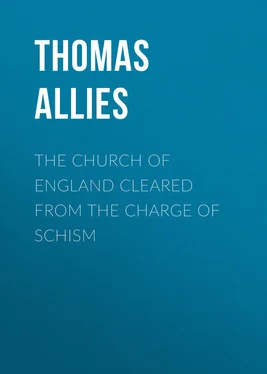Thomas Allies - The Church of England cleared from the charge of Schism
Здесь есть возможность читать онлайн «Thomas Allies - The Church of England cleared from the charge of Schism» — ознакомительный отрывок электронной книги совершенно бесплатно, а после прочтения отрывка купить полную версию. В некоторых случаях можно слушать аудио, скачать через торрент в формате fb2 и присутствует краткое содержание. Жанр: foreign_antique, foreign_prose, на английском языке. Описание произведения, (предисловие) а так же отзывы посетителей доступны на портале библиотеки ЛибКат.
- Название:The Church of England cleared from the charge of Schism
- Автор:
- Жанр:
- Год:неизвестен
- ISBN:нет данных
- Рейтинг книги:3 / 5. Голосов: 1
-
Избранное:Добавить в избранное
- Отзывы:
-
Ваша оценка:
- 60
- 1
- 2
- 3
- 4
- 5
The Church of England cleared from the charge of Schism: краткое содержание, описание и аннотация
Предлагаем к чтению аннотацию, описание, краткое содержание или предисловие (зависит от того, что написал сам автор книги «The Church of England cleared from the charge of Schism»). Если вы не нашли необходимую информацию о книге — напишите в комментариях, мы постараемся отыскать её.
The Church of England cleared from the charge of Schism — читать онлайн ознакомительный отрывок
Ниже представлен текст книги, разбитый по страницам. Система сохранения места последней прочитанной страницы, позволяет с удобством читать онлайн бесплатно книгу «The Church of England cleared from the charge of Schism», без необходимости каждый раз заново искать на чём Вы остановились. Поставьте закладку, и сможете в любой момент перейти на страницу, на которой закончили чтение.
Интервал:
Закладка:
Who can conclude otherwise than that St. Augustin in the year 400, as St. Cyprian in the year 256, was utterly ignorant of any such power as is now claimed for the See of Rome, under cover of that original Primacy to which both these great saints have borne indubitable witness? For the words of St. Cyprian, attested and approved by St. Augustin, contain the most explicit denial of that power lodged in the see of Rome as distinct from an Œcumenical Council, by which alone, if at all, the Church of England has been declared schismatical and excommunicate.
These are Bishops of the West speaking, but the East also must give its voice. St. Dionysius of Alexandria, and many other Eastern Prelates, among the rest Firmilian, Metropolitan of Cesarea, in Cappadocia, supported St. Cyprian on the question of rebaptization. The latter had been informed of St. Stephen's strong judgment and decided proceedings in the matter, who had threatened to separate the Bishops of the East also from his communion, if they did not comply with his rule. Firmilian wrote a long letter to Cyprian, which contains very remarkable expressions. He alludes in it more than once to the Primacy of St. Peter, and to that of Stephen as descending from him. 23 23 S. Cyp. Ep. 75.
"But what is the error, and how great the blindness of him ( i. e. the Pope) who says, remission of sins can be given in the meetings of heretics, nor remains in the foundation of the one Church which was once fixed by Christ upon the rock, may be hence understood, because to Peter alone Christ said, Whatsoever thou shalt bind on earth shall be bound in heaven, and whatsoever thou shalt loose on earth shall be loosed in heaven; and again, in the Gospel, when on the Apostles alone Christ breathed and said, Receive the Holy Ghost: whose sins ye remit they are remitted, and whose ye retain, they are retained. Therefore the power of remitting sins was given to the Apostles and the Churches which they, being sent by Christ, set up, and to the Bishops who have succeeded them by ordination in their stead … And here I am justly indignant at this so open and manifest folly of Stephen, because, glorying as he does in the rank of his Episcopate, and maintaining that he holds the succession of Peter, upon whom the foundations of the Church were laid, he introduces many other rocks, and sets up new buildings of many Churches, while he affirms, on his own authority, that Baptism is in them… Nor does he perceive that the truth of the Christian rock is clouded over by him, and in a manner abolished, who thus betrays and deserts unity… You Africans can say against Stephen, that, when the truth became known to you, you relinquished an erroneous custom. But we join custom also to truth, and to the custom of the Romans oppose a custom indeed, but that of truth, holding from the beginning this which has been delivered down from Christ, and from the Apostles." He had said before, "One may know that those who are at Rome do not in all things observe what has been delivered down from the beginning, and vainly allege the authority of the Apostles, even by this, that in celebrating Easter, and in many other sacred rites, one may see there is among them certain variations; nor are all things there kept as they are kept at Jerusalem; just as in very many other provinces also, according to the diversity of places and names, there are variations; nor yet on this account have the peace and unity of the Catholic Church ever been departed from. Which now Stephen has dared to do, breaking peace towards you, which his predecessors always kept with you, in reciprocal love and honour; casting, too, shameful reproach (infamans) on the blessed Apostles, Peter and Paul, as if they had handed this down, &c." The letter concludes with an apostrophe to Stephen, which only a regard to truth induces us to quote, so painful is its vehemence, though it proves ex abundanti the point we are upon: "And Stephen is not ashamed to assert this, that remission of sins can be given through those who are themselves in all their sins… But thou art worse than all heretics; for whilst many, acknowledging their error, come to thee thence to receive the true light of the Church, thou assistest the errors of those so coming… Nor understandest that their souls will be demanded at thy hand, when the day of judgment is come, who to the thirsting hast denied the Church's draught, and hast been the cause of death to those who would live. And moreover thou art indignant! See with what ignorance thou venturest to censure those who strive for the truth against falsehood. For who had most right to be angry at another; he who supports the enemies of God, or he who argues for the truth of the Church against him who supports God's enemies? except that it is evident that the ignorant are also passionate and wrathful, whilst, through lack of wisdom and discourse, they readily betake themselves to passion, so that it is of none other than thee that Holy Scripture says, 'The passionate man prepares quarrels, and the wrathful man heaps up sins;' for what quarrels and dissensions hast thou caused through the Churches of the whole world! But how great a sin hast thou heaped upon thyself, when thou didst cut thyself off from so many flocks; for thou hast destroyed thyself. Do not be deceived. Since he is the true schismatic who has made himself an apostate from the communion of the Church's oneness; for whilst thou dost fancy that all can be excommunicated by thee, thou hast excommunicated thyself alone from all … This salutary advice of the Apostle how diligently hath Stephen fulfilled! preserving humility of feeling and lenity, in his first rank , (primo in loco.) For what could be more humble or gentle, than to have disagreed with so many Bishops throughout the whole world, breaking peace with one and the other on various grounds of discord, now with the Eastern, as we are sure you are aware, now with you in the South; episcopal deputies from whom he received with such patience and mildness, that he did not even admit them to an interview; moreover, so mindful of the claims of charity and affection, that he charged the whole brotherhood, that no one should receive them into his house?" &c.
Concerning this remarkable history, Fleury says: 24 24 Liv. VII. sec. 32.
"It is not known what was then the issue of this dispute. It is certain that it still continued under Pope Saint Sixtus, successor of St. Stephen: this is seen by the letters that St. Dionysius of Alexandria wrote him; and it does not appear that St. Cyprian or Firmilian changed their mind." (So that St. Cyprian died under excommunication from Pope Stephen.) "Still St. Cyprian is counted among the most illustrious martyrs, even in the Roman Church, which names him in the Canon of the Mass, in preference to Pope St. Stephen; and the Greeks, in their Menologium, honour the memory of Firmilian. With reason, since we shall see him preside over the first Council of Antioch, against Paul of Samosata; and the Fathers of the second Council, writing to the Pope, name Firmilian, of happy memory, as they do Dionysius of Alexandria. Why the error of St. Cyprian and St. Firmilian hurt not their sanctity is, that they always preserved on their part the unity of the Church, and charity, and that they maintained in good faith a bad cause, which they believed good, and upon which there had not yet been a decision received by unanimous consent of the whole Church . Thus St. Augustin speaks of it, not counting as a final decision the decree of Pope St. Stephen, though true in its matter, and clothed with all the force that he could give it. No one of the ancients has accused these holy Bishops of obstinacy for not having obeyed this decree . The decision of Pope St. Stephen respecting the baptism of heretics has prevailed, because it was the most ancient and the most universal, and consequently the best… At length this question was entirely set at rest by the authority of the universal Council, that is to say, at the latest, at the Council of Nicea." Most fair and just: St. Cyprian and St. Firmilian may have innocently erred in such a matter; but what of the way in which they treated the Pope? Could they be ignorant of the constitution of that Church of which they were Primates, Saints, and one a Martyr? If his decision was final, must they not have known it? If his primacy involved their obedience, must they not have rendered it? But if they were his deputies, as the present Roman claim would have it, who can express their rashness? Had they been right, and the Pope wrong, according to the present tenets of the Latin Church, obedience had been better than sacrifice. In truth, they would have anticipated the noble submission of the Archbishop of Cambrai, and yielded at once to the chair of St. Peter, whatever had been their conviction as to the truth of their views; but the Archbishop of Carthage, the sternest defender of ecclesiastical unity and discipline which even the Church of the Fathers produced, knew not that he had any such duty towards the See of St. Peter.
Интервал:
Закладка:
Похожие книги на «The Church of England cleared from the charge of Schism»
Представляем Вашему вниманию похожие книги на «The Church of England cleared from the charge of Schism» списком для выбора. Мы отобрали схожую по названию и смыслу литературу в надежде предоставить читателям больше вариантов отыскать новые, интересные, ещё непрочитанные произведения.
Обсуждение, отзывы о книге «The Church of England cleared from the charge of Schism» и просто собственные мнения читателей. Оставьте ваши комментарии, напишите, что Вы думаете о произведении, его смысле или главных героях. Укажите что конкретно понравилось, а что нет, и почему Вы так считаете.












